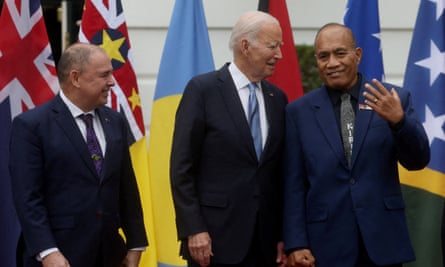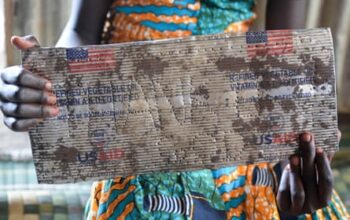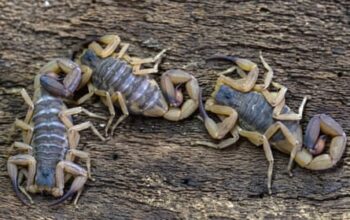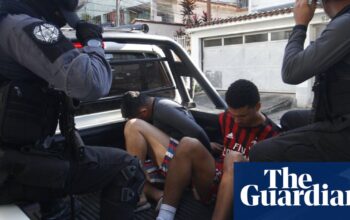The Cook Islands will host a significant gathering of Pacific leaders this week for the highly anticipated meeting on their regional schedule. Known as the Pacific Islands Forum (Pif), this is the primary decision-making organization for the area. This year’s talks are expected to heavily focus on the issue of climate change in preparation for COP28, as well as strategies for handling escalating geopolitical competition, such as the growing influence of China.
Before the summit, authorities verified that the heads of Papua New Guinea, Solomon Islands, Vanuatu, and New Zealand would be absent, which could impede progress on certain matters.
This is a summary of the forum and its significance.
Who comprises the group?
The Pif has 18 members, including Australia and New Zealand as the biggest economies. The other countries in the bloc are from Melanesia, Micronesia, and Polynesia. Tokelau, which is a territory of New Zealand, is also part of the group as an associate member. In the past, only sovereign countries were allowed to join, but French Polynesia and New Caledonia, both territories of France, have now become full members. The Pif also has an outer circle called “forum dialogue partners”, which includes countries like the US, China, and the UK.
What is the purpose of the forum?
The forum serves as the primary governing body for political decisions in the region. It is accompanied by a secretariat located in Suva, Fiji. In 2022, the leaders endorsed the 2050 Strategy for the Blue Pacific Continent, which is considered the region’s guiding principle and outlines a long-term vision for the Pacific. This strategy focuses on eight main areas of work, including political leadership and regionalism.
In the year 2023, it is anticipated that leaders will approve the implementation plan for the 2050 strategy. This will likely involve outlining how regional organizations will aid member states in addressing important matters like adapting to climate change and promoting economic development.
The leadership role in the group changes each year among its members. Currently, the chair of the Pif is Mark Brown, who is also the prime minister of Cook Islands. He will be hosting this year’s meeting. The Pif also has a “troika” of leaders consisting of the current chair, the previous chair, and the next chair. This troika serves as a source of advice for the forum chair. The secretariat is led by a secretary general, Henry Puna, who was previously the prime minister of Cook Islands.
What are the main concerns to keep an eye on?
The 2023 conference will take place from November 6th to 10th. The leaders will receive the Kiribati president, Taneti Maamau, who was absent in 2022 due to a major rift in the regional community caused by Micronesian frustration over the selection of Puna as secretary general instead of their preferred candidate. However, it seems that the group has overcome this challenge and there is optimism that a renewed emphasis on making decisions together will help navigate the increasingly crowded and complicated landscape, with China, the US, and other countries vying for more access and influence.
The United States and China are both dialogue partners at the forum. This could cause some unease, particularly for the US as it tries to counter China’s growing power. However, the Cook Islands prime minister, Mark Brown, as the host, and the Pacific Island Forum in general, hope that all partners will prioritize the interests of the Pacific region in their words and actions.
The absence of the prime ministers from Papua New Guinea, Solomon Islands, and Vanuatu at the meeting of the Melanesian sub-group will greatly diminish its significance. As a result, there is little hope for the Pacific Islands Forum as a whole to make substantial advancements on the matter of West Papua.
There is likely to be conflicting views on deep sea mining in the area. This issue has been ongoing and may intensify due to Brown’s endorsement of deep sea mining as a way to diversify the economy. Some nations, like Vanuatu and Fiji, have previously proposed a stop on deep sea mining.
During this meeting, Australia will urge the Pacific countries to fully support its proposal to host the COP31 climate talks in 2026. Despite some urging from former leaders of Pacific countries to withhold support due to lack of increased climate ambition from Australia’s Albanese government, it is likely that the bid will be successful.
What is the history of the Pif?
In 1971, the forum was established by leaders of recently independent Pacific countries who were dissatisfied with the South Pacific Commission’s decisions at the time. These leaders were present during discussions about their region, but the final decisions rested with colonial powers such as the UK, France, and the US. Important matters like discontinuing nuclear testing and self-determination were not addressed. To address this, Pacific leaders like Ratu Mara from Fiji formed their own organization where they had control.

Do all members come to a consensus on everything?
Agreements are reached through consensus, known as “the Pacific way”, resulting in lengthy discussions during the leaders’ retreat to finalize the annual meeting’s communique. The forum has successfully addressed important issues such as the establishment of a nuclear-free zone in the South Pacific. However, there have also been significant disagreements, particularly with Australia, regarding efforts to reduce carbon emissions and combat climate change.
-
Dr. Tess Newton Cain is the head of the Pacific division at Griffith Asia Institute in Brisbane, Australia, and also works as a freelance journalist.
Source: theguardian.com


